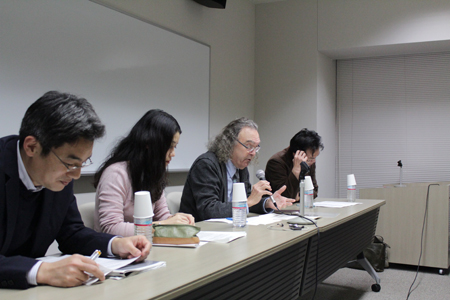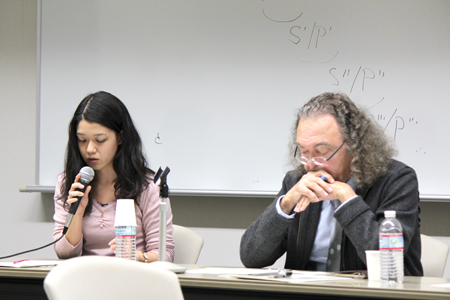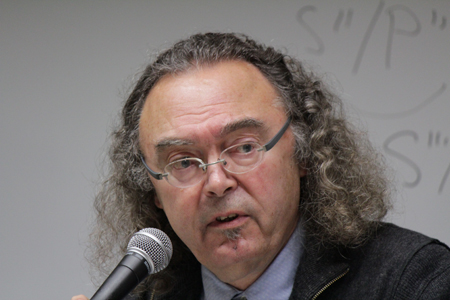[Report] Asian Philosophy Forum Lecture: Augustin Berque “Mesology (fûdoron) in the light of Yamanouchi Tokuryû's Logos and lemma”
On November 6th, 2012, Professor Augustin Berque gave a lecture entitled “Mesology (fûdoron) in the light of Yamanouchi Tokuryû's Logos and lemma” at Komaba campus.

The main topic of the lecture was what kind of logical framework works in the milieux (風土). Professor Berque started his lecture by telling characters of milieux through a history of mesology (風土論). Platonian concept ‘chôra’ (χώρα) should be regarded as origin of mesology, and the distinction between ‘environment’ and ‘millieu’, which are mainly advanced by Uexküll and Heidegger, developed mesology historically. While the concept ‘environment’ based on the strict division of subjectivity and objectivity, the concept ‘milieu’ is based on 'trajection'. mesology overcomes modern dualism and denies the principle of the excluded middle.
Then he showed an analogy between the main concepts of mesology --especially ‘mediance’ and ‘trajection’-- and the logos of lemma (lemmic) which was put forward by Yamanouchi Tokuryu. Lemmic admit not only assertion (A) and negation (non-A) but also binegation (neither A nor non-A ) and biassertion (both A and non-A). From this analogy, Professor Berque insisted that the logic of milieux should be a lemmic.
After Professor Berque's presentation, two commentators had a chance to exchange opinions with him.
Professor Shinji Kajitani told about his own understanding of reality --originally in manifold-- and showed a common point among his 'reality', Heidegger's 'Welt', and Professor Berque's 'milieu': those all refuse the principle of the excluded middle. Based on this common point, he asked how Professor Berque consider the actual relationship between A and non-A which exist at the same time. Professor Berque reserved an answer, but he strictly denied to assume an absolute basis above A and non-A. We need to keep modestly to a profane and agnostic use of the tetralemma.
I, Wakako Godo asked how the lemmic which lacks temporality can be a framework of mesology which can essentially demand historicity. Professor Berque suggested that the structure of our reality and the lemmic which works there could be rather more understandable when we consider our historicity and evolutional process.

A lively discussion followed with questions and comments from the audience. Advantages of mesology were clarified through it. Honestly, I am still not certain that lemmic functions well to explain our reality and milieu. However, on the other hand, I found a lot of hopeful points of mesology. Mesology stretches over various fields like philosophy, biology, geography, architecture and so on. Mesology can bring together many researchers from different fields and give them opportunities to work together. It will surely bring us deeper understanding of our reality and world.

(Report: Wakako Godo)






